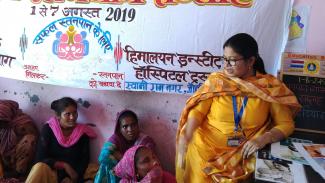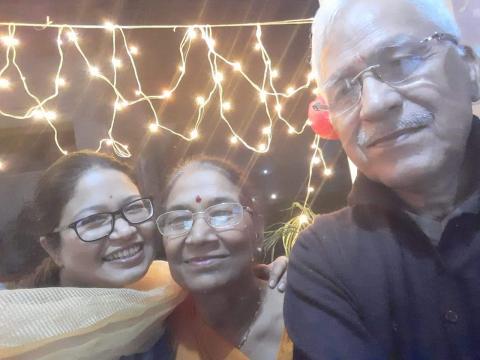
Dr. Vidisha Vallabh, 34 from Dehradun shares in great detail the challenges of living with Pulmonary Hypertension, dealing with the emotional challenges, the support of her family and how she has had to relook at her priorities and learn to accept her situation.
Please tell us about your condition. What were the early symptoms? What made you go see a doctor?
I have been diagnosed with Pulmonary Hypertension in the year 2019. Severe Fatigue, Fever, Anxiety, Mild Cough, Blue nail beds were the early symptoms
This, later on, progressed into increase in heart rate, anxiety, choking on lying down, breathlessness, inability to do my routine work like bathing, walking, talking due to breathless and fatigue.
Please describe your experience of managing your condition.
I had a lung disease previously (Pulmonary Sarcoidosis) and had experienced similar symptoms. When my symptoms recurred, I feared an acute exacerbation of Sarcoidosis.
On meeting a pulmonologist and cardiologist, after preliminary investigations, I was suggested an ECHO followed by a Right Heart Catheterisation. The pressure in my blood vessels of the lungs was found to be raised and hence my diagnosis was made. My doctors advised me to look at lung transplant options as my prognosis seemed bleak.
I took leave from work to recuperate and to come at terms with my diagnosis. The months following my diagnosis came straight from purgatory. I broke down into tears frequently and found myself unable to do anything but cry and think. I was physically and mentally exhausted.
I started anti-hypertensives on my doctor’s advice. I also started cardio-pulmonary rehabilitation under a cardiopulmonary physiotherapist. I bought oxygen concentrator for hypoxic episodes. With immense support from my parents, who have been by my side all along, I have slowly started threading my life back on the loom.
What is your present condition?
The anti-hypertensives have kicked in and now I find myself able to talk and perform my daily activities without the need for oxygen support. I have rejoined work remotely, for which I am extremely thankful to my employers who have supported me.
These medicines have bought me some time to think about a lung transplant in the coming years and to manage my finances as transplant costs are back-breaking in India.
Do you have a family history of your condition?
No, there is no family history.
Have you had any related complications from your primary condition?
My Doctors feel that my PH might be due to pulmonary sarcoidosis but my disease behaves like primary PH hence it is difficult to say. Apart From that, I have no complications due to PH.
What was your course of treatment? What medications are you on currently?
I started anti-hypertensives on my doctor’s advice. I also started cardio-pulmonary rehabilitation under a cardiopulmonary physiotherapist. Currently, I am on Methotrexate, Deflazacort, Lacilactone, Macitentan, Tadalafil, Diltiazem, Ecospirin, and Long Term Oxygen Therapy.
Were there any side-effects of the medicines? If yes, how do you manage them?
I get:-
- Frequent bruising: I do nothing, it fades on its own
- Bodyaches and muscle cramps: I use a shiatsu massager for them, I try to avoid painkillers unless very necessary.
- Hot-Flashes: I use a cold towel to cool down.
- Anxiety, Panic Attacks and Fatigue: I do breathing exercises, full-body relaxation and try to sleep it out.
- Depression: I listen to classical music, write poetry, read (a lot), watch movies, do gentle stretches, talk to my family. I simply try and engage myself in a positive activity.
- Gastritis and irritable bowel: I eat light, home-cooked meals. I have cut down sugar, salt, spicy food, refined food and fast food. I eat millets, fruit and vegetables and sometimes curd.
- Weight gain: I eat light, home-cooked meals. I have cut down sugar, salt, spicy food, refined food and fast food. I eat millets, fruit and vegetables and sometimes curd. I try to take a walk after meals and do domestic chores if I feel up to it.
- Hair-loss and poor skin texture: I take vitamin supplements, and do massages as often as I can. I do not use any cosmetics or fancy skincare products. I rely heavily on almond oil and aloe vera.
- Alienation from friends: I have come to terms with my illness and I do not worry if anyone wishes to part ways.
What kind of specialists (including Physio/ Occupational therapist/ Psychiatrist etc) do you consult and how often?
- Pulmonologist: every 3 months
- Cardiologist: every 3 months
- Physiotherapist: weekly (now doing on my own as I have limited my movement to avoid COVID exposure.
Did you have to travel outside your city for your medical treatment or consult?
Yes
Have you learnt anything in managing in your condition that you wish you knew before?
Yes, I should not have waited a long time to get the diagnosis, I kept ignoring my symptoms and I paid heavily for this.
Have you tried complementary medicine or therapies, like homoeopathy or yoga? If yes, did it help?
I did try Ayurveda but it did not have any effect. There were so many dietary inhibitions that it became a headache to manage it and I ended up becoming sicker.
How did you mentally/emotionally cope with your condition?
I initially had a meltdown and spent many days in isolation. I reached out for help and found a group of PH Warriors based in India (HTTP and Pulmonary Hypertension India). We got in touch via social media and this group has been a boon for my mental health. Apart from that, I am a voracious reader and write poetry, I enjoy listening to classical music and am a fan of world cinema. I also rejoined my job. All these have helped me in coping with my condition.
Did you see a counsellor for support? Were you offered counseling by your doctor?
I did not see a counsellor and i was not offered counselling by my doctor.
How has your family supported you? Who has been your biggest support/companion through it all?
I am alive today only due to my family members, who worked with me day and night. Right from taking me to appointments, staying with me during hospitalisation, cheering me up when I felt downtrodden and providing me financial support.

How did your friends treat you? Were you isolated? Did you share your experience with them soon after the diagnosis?
I had a mixed experience with my friends. I shared my experience after some time.
Most of them felt sorry, many of them shied away from me; they found it difficult to converse with me. Many of them did not stay in touch when I failed to call them. I didn’t feel sad because this is how long our journey together meant to be.
Some friends supported me wholeheartedly. They drove me to and fro from work, took on my assignments and cheered me on. They called me despite my mood swings, sent me messages, letters and gifts. They helped me by just being there.
It might not mean much to them, but for a chronic disease patient who is conserving her energy, those tiny things meant the world.
What were some of the challenges you faced and what is your advice to patients who face similar challenges?
My challenges while maintaining my physical health were:
- Mental health
- Energy Conservation
- Maintaining my daily routine
- Being self-reliant in terms of finances and self-care
My advice is to TAKE IT SLOW. CALM DOWN. LIVE FROM Day to Day. The more you worry, the less you live.
Take your time to know the new normal of your body. Explore your limits. Ask for help, don’t feel shy; people will definitely help you. Join physiotherapy, yoga, meditation and learn energy conservation tips. Walk and stretch. Work if you can. Talk to your family and friends; they love you. Join a support group. Ask questions from your doctor; if you are not happy with them, seek a second opinion. Live from day to day; every minute your life as a PH warrior is different from the one before. If you are sick today, you might be better tomorrow. Don’t think what will happen tomorrow. Don’t think what will happen after you are gone; you will not be there to see it.
How has your diagnosis changed your life perspectives and ambitions?
I was a major worrier. I had put everything on hold for my studies and career. When I finally got time, I was diagnosed with PH.
It changed my outlook on life. From a busy planned field-based career, I changed my direction towards academics, which was not only more fulfilling but also allowed me to take care of myself. Though I am frequently discouraged from working, I continue to do so as it keeps me busy and away from obsessing on my disease. Since my diagnosis, I have started keeping myself as my priority. I have learned to say no and not feel bad about it. I have started living life as I please and for once I’m not sorry about it.
What keeps you awake at night?
The fear of an untimely, painful and lonely death often kept me up during the early days. But I am at peace with it now. Death is inevitable and it will come for me for sure at the sun rises in the east. But I cannot stop living my life because of this. Hence I simply put on my music and my smile and rest every night without fear.





